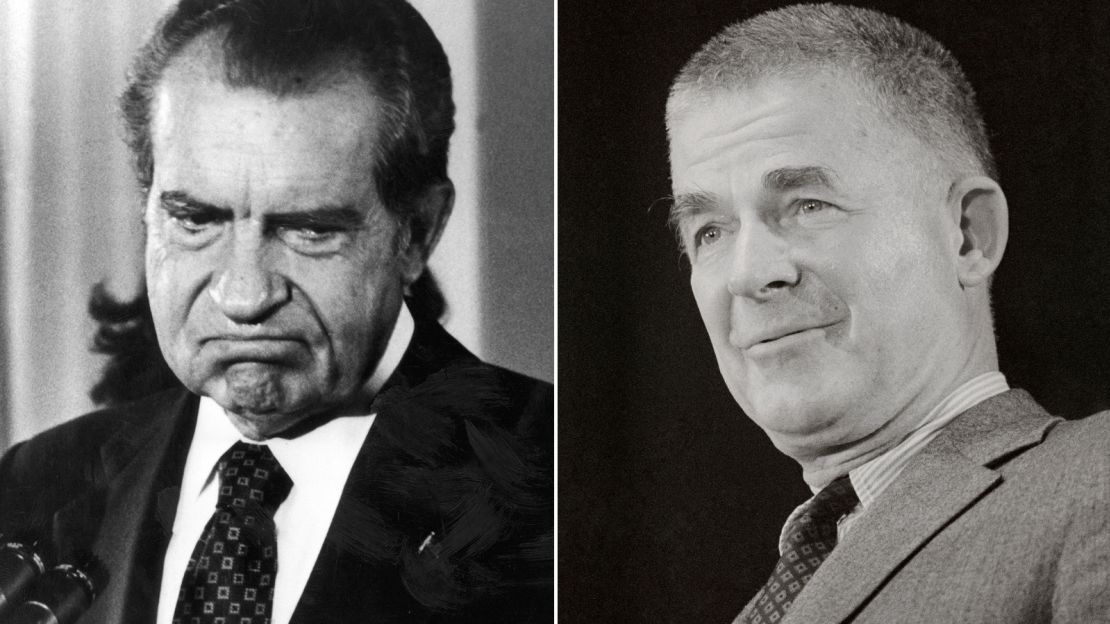Story highlights
Richard Nixon ordered Watergate special prosecutor to be fired in 1973
Trump critics call for appointment of special prosecutor to investigate alleged dealings between Trump campaign and Russia
The “Saturday Night Massacre” was one of the most dramatic turns of events in the Watergate scandal – the political drama that rocked the United States in the 1970s and led to the resignation of President Richard Nixon.
President Nixon and the Attorney General’s office were locked in a political standoff over Nixon’s refusal to comply with orders to release recordings of White House conversations.

Nixon ordered the firing of Watergate special prosecutor Archibald Cox. But Attorney General Elliot Richardson and his deputy William Ruckelshaus resigned rather than comply with the order. Cox was eventually fired by the US solicitor general.
Critics of President Trump’s firing of FBI director James Comey see similarities between Cox’s firing decades ago and Trump’s action on Tuesday.
The Trump administration, critics say, is trying to undermine the FBI’s investigation into allegations of collusion between Russia and the Trump campaign, just as Nixon tried to stop lawmakers from learning the truth about his role in the Watergate scandal.
“President Trump’s firing of Director Comey sets a deeply alarming precedent as multiple investigations into possible Trump campaign or administration collusion with Russia remain ongoing, including an FBI investigation,” Sen. Ed Markey, D-Massachusetts said.
“This episode is disturbingly reminiscent of the Saturday Night Massacre during the Watergate scandal and the national turmoil that it caused,” he said. “We are careening ever closer to a Constitutional crisis, and this development only underscores why we must appoint a special prosecutor to fully investigate any dealings the Trump campaign or administration had with Russia.”
John Podesta, former chairman of the 2016 Hillary Clinton presidential campaign, tweeted at Trump: “Didn’t you know you’re supposed to wait til Saturday night to massacre people investigating you?”
This isn’t the first time Trump’s critics have invoked the “massacre” comparison – some dubbed Acting Attorney General Sally Yates’ firing in January the “Monday Night Massacre.”
And, this isn’t the first time an FBI director was fired. In 1993, President Clinton dismissed William Sessions after ethics issues emerged about Sessions’ conduct in a report by the Justice Department’s Office of Professional Responsibility.
While Democrats slammed Trump’s decision on Comey as “Nixonian,” some members of the President’s own party expressed concerns and divided traditional GOP alliances.
Arizona Sen. John McCain said he was “disappointed” by the incident. Sen. Bob Corker, who chairs the Senate Foreign Relations Committee and occasionally advised the Trump campaign last year, said he also had concerns.
“Regardless of how you think Director Comey handled the unprecedented complexities of the 2016 election cycle, the timing of this firing is very troubling,” said Sen. Ben Sasse of Nebraska in a statement.
The Watergate scandal
The Watergate scandal began in June 1972, when five men were arrested for breaking into the Democratic National committee headquarters in the Watergate complex in Washington. The Washington Post reported at the time that the FBI believed the break-in was carried out by aides to President Nixon.
Former FBI agent G. Gordon Liddy and former CIA employee James McCord, security director of the Committee to Re-elect the President, were found guilty of conspiracy, burglary and bugging DNC headquarters. E. Howard Hunt, a former CIA operative, and four others involved ended their trials by pleading guilty.
Four of President Nixon’s aides resigned amid the growing scandal: John Dean, White House counsel; H. R. Haldeman, chief of staff; John D. Ehrlichman, assistant for domestic affairs; and Attorney General Richard G. Kleindienst.
Americans were glued to the TV in 1973 to watch the nationally televised Senate hearings on Watergate.
Cox was appointed as special prosecutor. John Dean testified about the White House and Nixon’s involvement in the Watergate break-in and cover-up.
The revelation from former aide Alexander Butterfield that President Nixon had been secretly recording all of his White House conversations since 1971 set the stage for the “Saturday Night Massacre” and, eventually, Nixon’s resignation.
Nixon resisted turning over the presidential tapes despite subpoenas from a Senate subcommittee and a request from Cox.
Federal Judge John Sirica then ordered Nixon to turn over the tapes to Cox to be privately examined, but Nixon didn’t comply. He appealed all subpoenas and orders to surrender the tapes. His appeal was denied.
The President was once again ordered to turn over the tapes to Cox.
Nixon offered to provide a summary of the White House conversations, which he would personally edit and would be verified by Sen. John Stennis, D-Mississippi. That offer, too, was rejected.
Nixon ordered Cox to stop pursuing the tapes, and Cox refused.
On October 20, 1973, President Nixon ordered that Cox be fired, prompting Richardson and Ruckelshaus’ resignations.
Solicitor General Robert Bork eventually fired Cox; days later, Leon Jaworski was named special prosecutor.
Eventually, tapes turned over to Jaworski revealed a conversation from June 23, 1972 that proved Nixon’s knowledge of a cover-up in the Watergate case
Nixon resigned from office in August 1974, and Vice President Gerald Ford became President.
CNN’s Tom LoBianco and the CNN Library contributed to this report.



